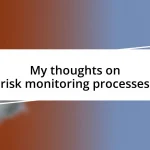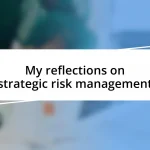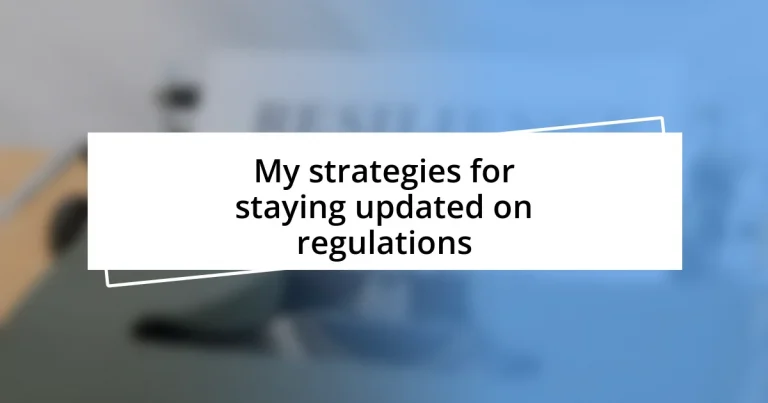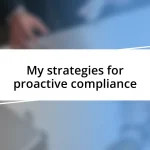Key takeaways:
- Regulations create a safe environment, foster accountability, and promote trust, benefiting both businesses and consumers.
- Staying informed about regulatory changes can be enhanced through government resources, industry newsletters, and professional networks that provide timely updates and insights.
- Implementing personal tracking systems and utilizing technology can improve efficiency in monitoring compliance deadlines and regulations, supporting proactive management within teams.
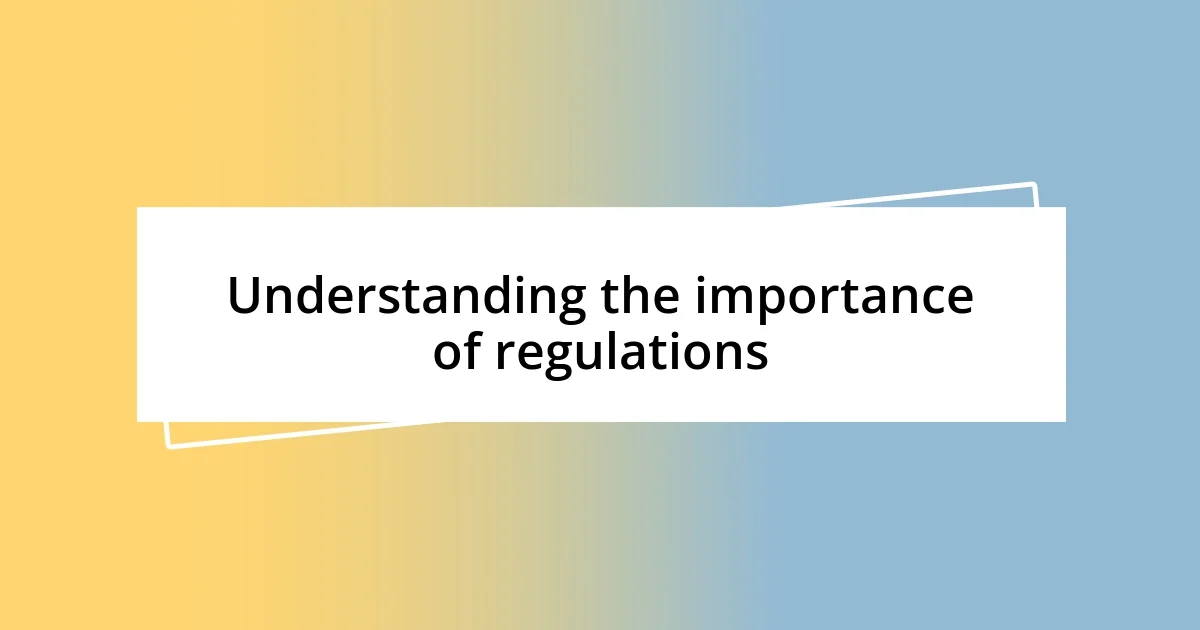
Understanding the importance of regulations
Regulations play a crucial role in creating a safe and fair environment for everyone involved. I often reflect on my early days in the industry when a small compliance misstep could have led to significant repercussions—not just for my company, but for our clients too. Isn’t it comforting to know that regulations act as a safety net, protecting all parties and fostering a culture of accountability?
When I think about the importance of regulations, I’m reminded of an instance where a new rule about data protection turned my entire approach to client interactions upside down. It wasn’t just about what was required; it sparked a deeper commitment to protecting my clients’ information. How many times have we seen trust broken due to negligence? Regulations help in preserving that crucial trust, which is the foundation of any successful relationship.
On a broader scale, regulations ensure a level playing field, encouraging healthy competition. I remember sitting in a meeting where new compliance measures were discussed, and it hit me: without these rules, we might have seen bigger firms overpowering the smaller ones, leaving innovative ideas to wither away. Isn’t that a thought worth exploring? Regulations foster innovation by ensuring that everyone has a fair shot, which ultimately benefits consumers and businesses alike.
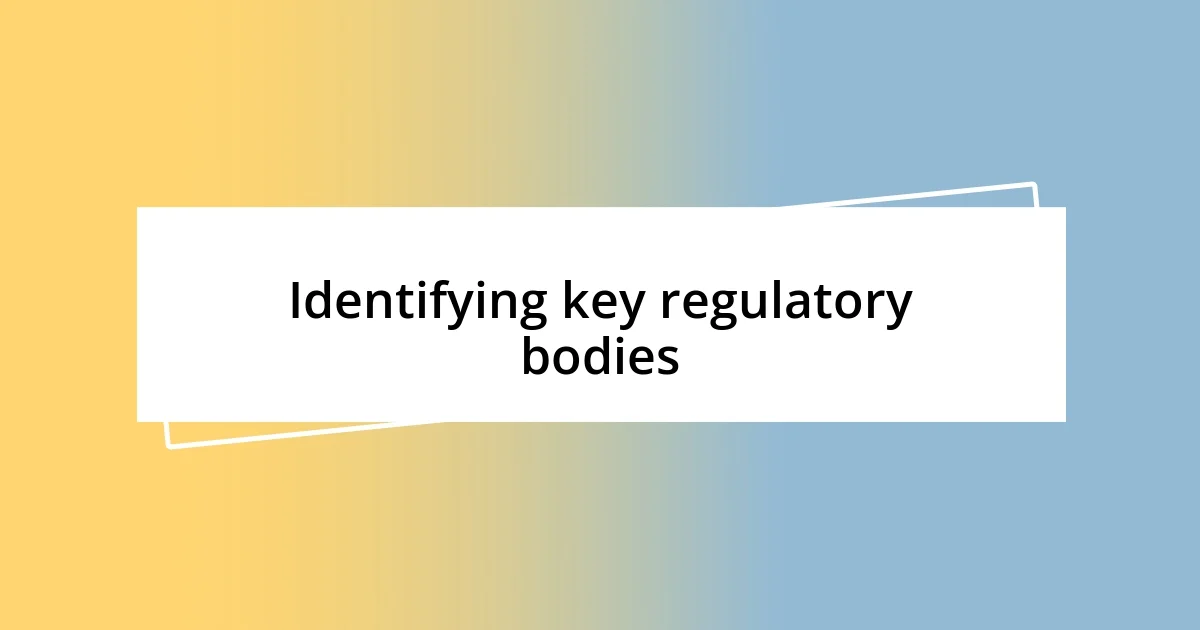
Identifying key regulatory bodies
Identifying key regulatory bodies is essential for staying on top of industry standards. Over the years, I’ve learned that knowing where to look is half the battle. For instance, when I first navigated the complex world of financial regulations, I quickly realized that entities like the SEC (Securities and Exchange Commission) and FINRA (Financial Industry Regulatory Authority) were fundamental in keeping abreast of appropriate practices. Each body has its own focus, making it vital to identify which ones are most relevant to my field.
I still recall the first time I attended a regulatory conference. The room buzzed with energy as representatives from different regulatory bodies shared insights about upcoming changes. It struck me how interconnected these organizations are, and understanding their roles shed light on the intricate web of compliance. Spotting details from the FDA or EPA might seem daunting, but considering their impact on health and safety, it’s undeniably worth the effort.
To streamline my research process, I often compile a tabular overview of these key bodies. This way, I can quickly reference their jurisdiction and importance without sifting through piles of documents. Such organization ensures that I stay informed and ready to adapt—an essential skill in today’s fast-paced world.
| Regulatory Body | Focus Area |
|---|---|
| SEC | Securities and Exchange |
| FINRA | Brokers and Dealers |
| FDA | Food and Drug Safety |
| EPA | Environmental Protection |
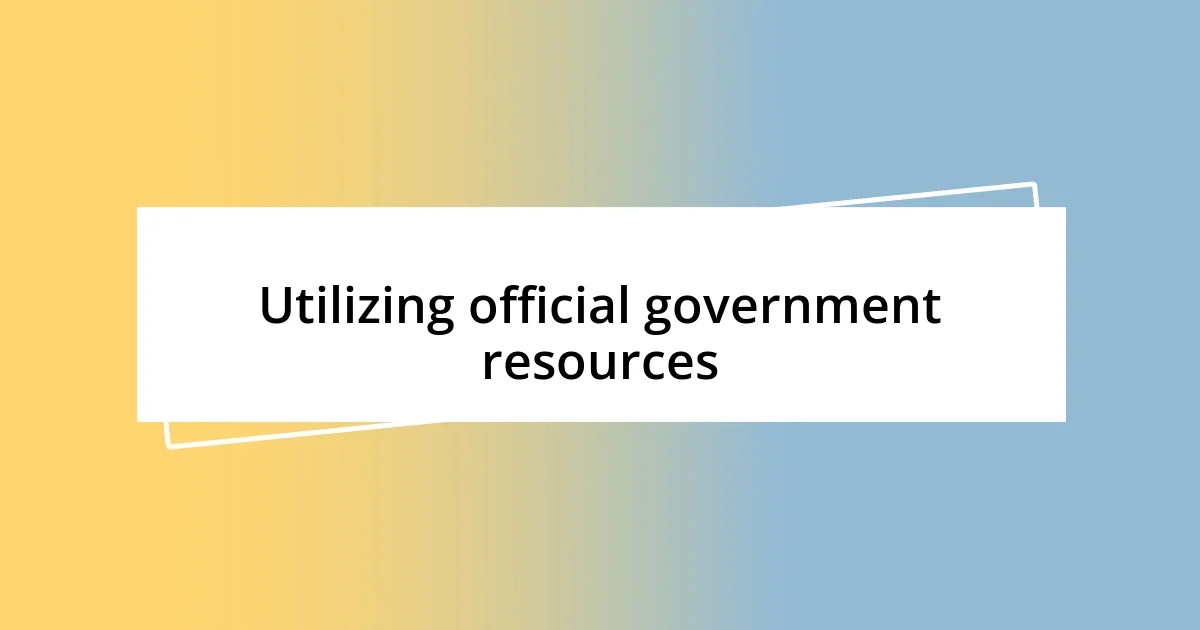
Utilizing official government resources
Utilizing official government resources can be a game-changer in staying compliant with regulations. I’ve often turned to websites like Regulations.gov or the Federal Register to explore new guidelines, and the wealth of information they offer is impressive. Just the other day, I stumbled upon an important update regarding labor laws that I would have missed if I hadn’t checked regularly. It’s like having a direct line to crucial information that supports my professional decisions.
Here are some ways you can effectively utilize these government resources:
- Subscribe to newsletters: Most regulatory bodies offer newsletters that summarize key updates. I find these to be time-savers.
- Set alerts: Use tools that notify you of changes in regulations relevant to your field. It’s active monitoring without the headache of constant checking.
- Attend webinars: Government agencies often host informative sessions. I once joined one on healthcare regulation which not only clarified my doubts but also connected me with experts in the field.
- Explore social media: Follow official accounts for real-time updates. I love seeing instant posts that highlight changes and related stories.
- Download mobile apps: Some agencies have apps that provide on-the-go access to essential information; they can be incredibly useful during meetings or conferences.
These strategies have transformed my approach to compliance, making it proactive rather than reactive.

Subscribing to industry newsletters
Subscribing to industry newsletters has been a cornerstone of my strategy to stay informed about regulatory changes. I remember when I first came across a newsletter from a leading regulatory body; it was like discovering a treasure trove of knowledge that I didn’t know I was missing. The bite-sized updates made complex information much more digestible, allowing me to keep up without feeling overwhelmed. It genuinely felt refreshing to receive curated insights directly in my inbox, as if I had my own regulatory expert guiding me.
One thing I truly value about these newsletters is their focus on trends and imminent changes. For instance, I recall a time when a significant update on cybersecurity regulations was published, just days before it was set to take effect. Had I not been subscribed, I might have scrambled to understand the implications. Doesn’t it make you wonder how much critical information we can miss without these regular updates? Having that proactive approach has saved me countless hours that could’ve been spent playing catch-up.
I find that personalizing my subscriptions is equally important. For example, I’ve tailored my feeds to include not just the essential bodies, but also niche organizations specific to my field. This way, I also get insights from smaller groups that may have emerging trends or changes. Last month, a newsletter I received featured a small legislative update that inspired me to reevaluate our compliance procedures. What if you could harness that same power? By curating your subscriptions, you can become an insightful leader within your organization.
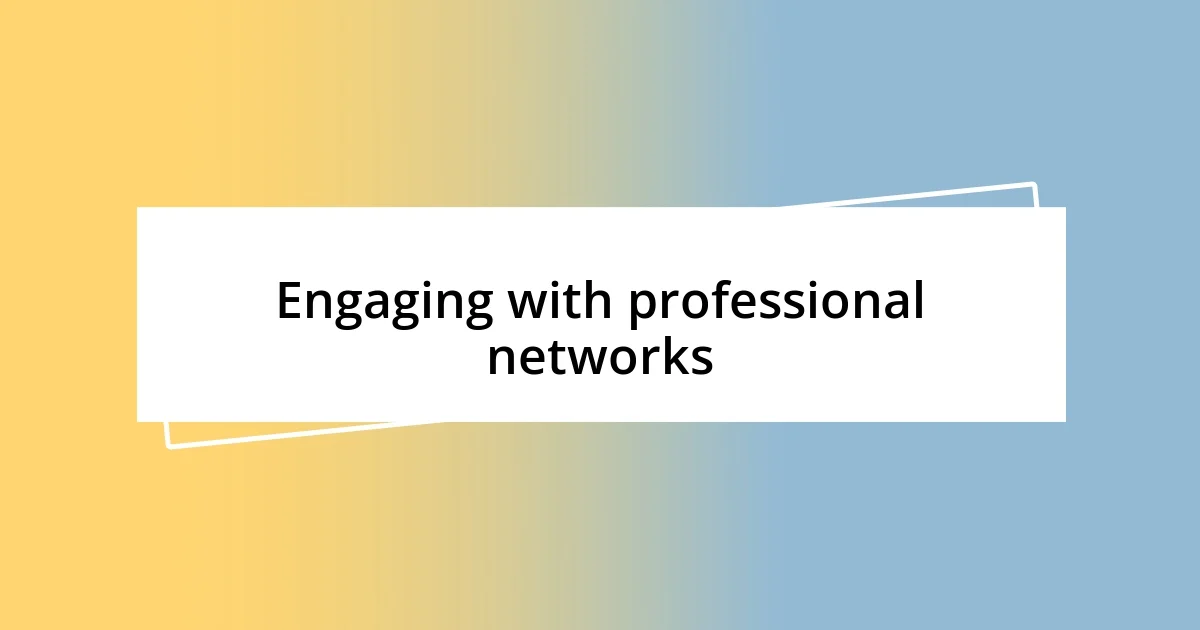
Engaging with professional networks
Connecting with professional networks has been instrumental in my journey to stay updated on regulations. I remember joining a local chapter of my industry association and feeling immediately engaged with peers, all of us sharing insights and strategies. It was there I learned about a crucial compliance deadline that had slipped under my radar. Isn’t it fascinating how shared knowledge can dramatically shift our understanding?
I often find that the conversations I have within these networks spark ideas and drive home the importance of staying informed. At one networking event, I met a compliance officer who shared a recent experience where a regulatory change almost caught her organization off guard. Her story not only highlighted the significance of being proactive but also emphasized the tremendous resource that a strong professional network can be. How many valuable lessons can we learn from each other’s experiences?
Moreover, engaging in online forums has opened up a wealth of information as well. Just last month, I participated in a webinar where experts discussed upcoming regulatory shifts. The insights shared during those sessions provided clarity on complex issues I had been grappling with. It made me realize that asking questions and seeking help from my peers not only enriches my knowledge but also fosters a collaborative spirit. Isn’t it reassuring to know we’re not alone in navigating this ever-changing landscape?
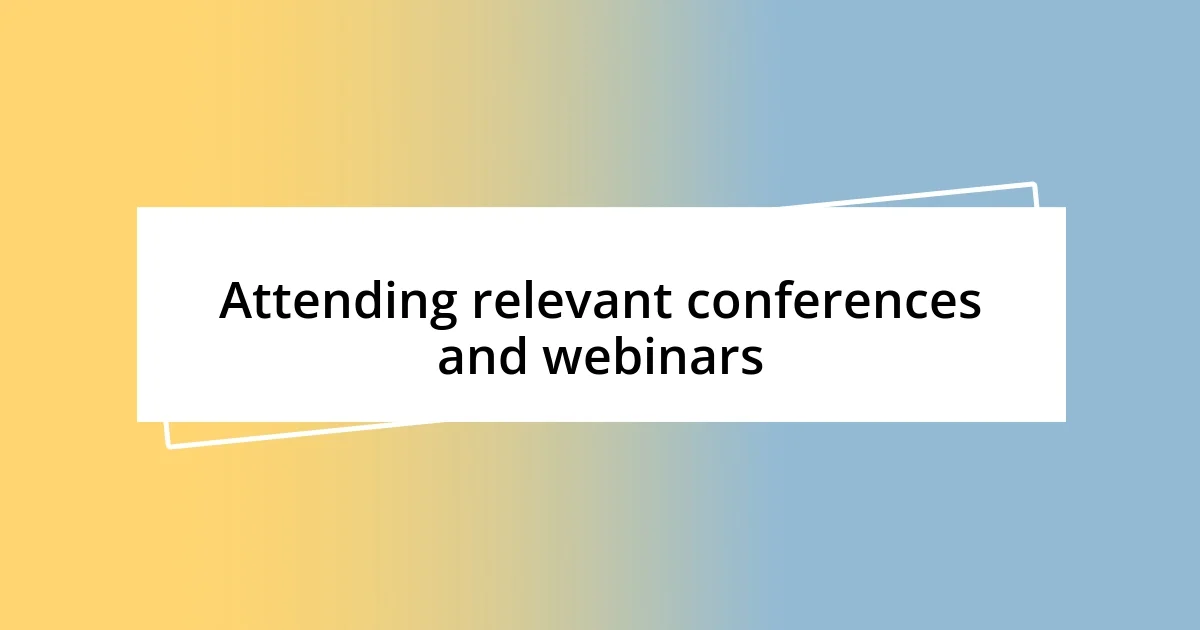
Attending relevant conferences and webinars
Attending relevant conferences and webinars
Diving into conferences and webinars has been a game-changer for me in terms of staying updated on regulations. I vividly remember attending an annual industry conference where a panel of experts discussed new compliance laws that were on the horizon. Just being in that room felt electrifying; the atmosphere buzzed with anticipation and the exchange of groundbreaking ideas. Isn’t it invigorating to be surrounded by passionate individuals who are all striving for the same goal?
During one particularly memorable session, I encountered a speaker who was not just knowledgeable but also incredibly engaging. They broke down the complexities of a major regulatory reform and, to my surprise, made it digestible. The real-time feedback from attendees created a dynamic discussion, offering perspectives I hadn’t considered. Have you ever found that the ideas shared in these settings unlock solutions you’d been searching for? I certainly did—taking a few notes that day led to strategic adjustments in our compliance strategy.
Webinars are just as valuable, especially for those of us with packed schedules. Just last month, I logged in to a webinar focused on cybersecurity regulations. The expert’s insights about the upcoming changes felt like a lifeline amidst all the information swirling around. I took the opportunity to ask a question, and to my delight, the response provided clarity that transformed my understanding of the issue. Have you ever left a webinar feeling like you’ve gained a new ally in your quest for knowledge? That’s the power of engaging directly with experts in the field, and it’s a strategy I intend to continue leveraging.
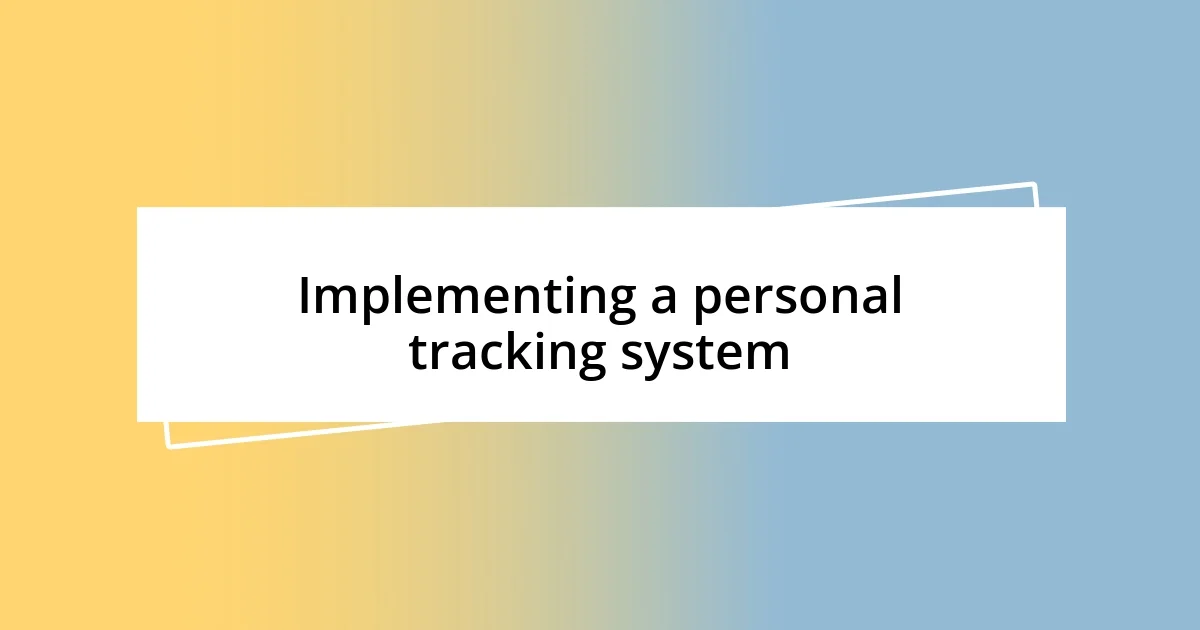
Implementing a personal tracking system
Implementing a personal tracking system has been a revelation for me in keeping tabs on regulatory changes. A few years back, I decided to create a simple spreadsheet to monitor key regulations and their deadlines. Each time I added a new entry, I could feel a sense of control wash over me. Have you ever felt overwhelmed when deadlines loom? This tracking system has turned that anxiety into manageable tasks, with reminders populating my calendar just when I need them.
Recently, I discovered the power of integrating digital tools like apps and project management software. After a friend recommended a task organizer, I was skeptical at first but decided to give it a shot. To my surprise, the app not only helped me visualize deadlines but also allowed me to categorize regulations by priority. This clarity helped me avoid last-minute scrambles. Isn’t it incredible how a little technology can streamline our efforts and boost our efficiency?
I also realized that sharing this tracking system with colleagues adds an extra layer of accountability. I set up monthly check-ins where we review our lists together, discussing upcoming changes and supporting each other’s progress. This collaborative approach not only keeps everyone engaged but also encourages us to share resources that might be helpful. Isn’t it reassuring to know that we’re not just accountable to ourselves but also to a larger team working towards the same goal?




